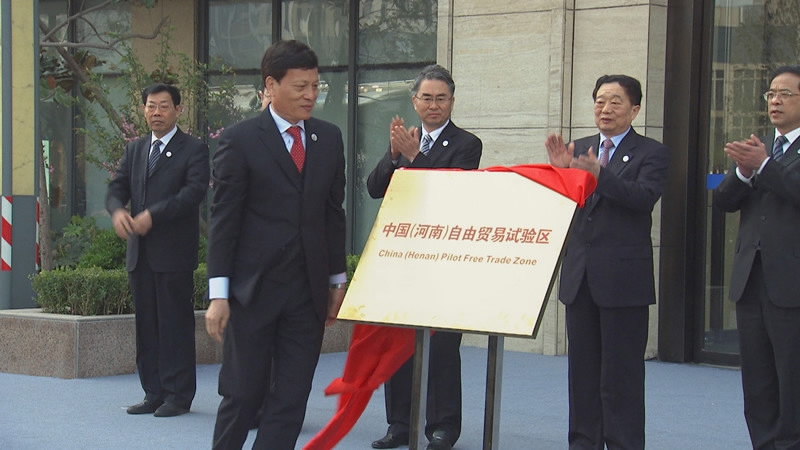By CGTN's Xia Ruixue
The inauguration of China's Henan Province pilot free trade zone (FTZ) kicked off on Saturday, in Zhengzhou, the provincial seat.
A total of seven new FTZs have been established across the nation, situated in the provinces of Liaoning, Zhejiang, Henan, Hubei, Sichuan and Shaanxi. Chongqing Municipality also plays host to an FTZ, with relaxed investment regulations helping promote free trade.
Henan Province's pilot FTZ covers a 120 square-kilometer area surrounding Zhengzhou, including both Luoyang and Kaifeng.

CGTN Photo
Jiao Jinmiao, director of Henan's Department of Commerce, said that while Henan has a reputation for being a major agricultural province, it's also very good at other forms of business. Last year, foreign trade volumes were among the top ten in China.
Xu Chaofeng is one of many that has waited a long time for this. For many years, the wine dealer knew of the investment potential within Henan Province, especially in the wine business. However he had no opportunity, as importing wines at a reasonable price was simply out of reach.
"Previously, very few chateaus were willing to make direct deals with me, because it was too complicated," said Xu. "I had to declare my imported wines in Shanghai or Qingdao, and then have them delivered to Zhengzhou. It took us a long time and the costs were high. Now everything can be done here in Zhengzhou. After the establishment of the FTZ, the cost of one bottle of wine is now half the price of what it was before."
China's FTZs are designed to lower the threshold requirements for company set up, while also cutting restrictions on capital flows and offering greater market access for foreign investment.
Henan Province will use its strategic location to build a stronger regional logistics center. To this end, the province will implement a three-dimensional traffic system and modern logistics system. It will also focus on transforming itself into a transport hub along China’s Belt and Road Initiative connection with Europe and Asia.
Di Aming, director of Xiaohongshu Zhengzhou Branch said, “We hope we can do business with greater convenience and that trade liberalization will be realized. I hope the local government can manage our tax and foreign exchange concerns."
China’s first and second batch of FTZs were all established along the coast.
This time however, five of the seven new zones have been set up in inland regions, a reflection that central and western China will be the new frontiers for foreign investment in the country.
Henan used to be known as one of China’s most rural, most densely populated and least developed provinces. Now it has transformed into a dynamic and innovative part of China by restructuring itself as an integrated transport hub. Its free trade zone is believed to help boost the regional economy.









